- Home
- FPMT Homepage
Foundation for the Preservation of the Mahayana Tradition
The FPMT is an organization devoted to preserving and spreading Mahayana Buddhism worldwide by creating opportunities to listen, reflect, meditate, practice and actualize the unmistaken teachings of the Buddha and based on that experience spreading the Dharma to sentient beings. We provide integrated education through which people’s minds and hearts can be transformed into their highest potential for the benefit of others, inspired by an attitude of universal responsibility and service. We are committed to creating harmonious environments and helping all beings develop their full potential of infinite wisdom and compassion. Our organization is based on the Buddhist tradition of Lama Tsongkhapa of Tibet as taught to us by our founders Lama Thubten Yeshe and Lama Thubten Zopa Rinpoche.
- Willkommen
Die Stiftung zur Erhaltung der Mahayana Tradition (FPMT) ist eine Organisation, die sich weltweit für die Erhaltung und Verbreitung des Mahayana-Buddhismus einsetzt, indem sie Möglichkeiten schafft, den makellosen Lehren des Buddha zuzuhören, über sie zur reflektieren und zu meditieren und auf der Grundlage dieser Erfahrung das Dharma unter den Lebewesen zu verbreiten.
Wir bieten integrierte Schulungswege an, durch denen der Geist und das Herz der Menschen in ihr höchstes Potential verwandelt werden zum Wohl der anderen – inspiriert durch eine Haltung der universellen Verantwortung und dem Wunsch zu dienen. Wir haben uns verpflichtet, harmonische Umgebungen zu schaffen und allen Wesen zu helfen, ihr volles Potenzial unendlicher Weisheit und grenzenlosen Mitgefühls zu verwirklichen.
Unsere Organisation basiert auf der buddhistischen Tradition von Lama Tsongkhapa von Tibet, so wie sie uns von unseren Gründern Lama Thubten Yeshe und Lama Thubten Zopa Rinpoche gelehrt wird.
- Bienvenidos
La Fundación para la preservación de la tradición Mahayana (FPMT) es una organización que se dedica a preservar y difundir el budismo Mahayana en todo el mundo, creando oportunidades para escuchar, reflexionar, meditar, practicar y actualizar las enseñanzas inconfundibles de Buda y en base a esa experiencia difundir el Dharma a los seres.
Proporcionamos una educación integrada a través de la cual las mentes y los corazones de las personas se pueden transformar en su mayor potencial para el beneficio de los demás, inspirados por una actitud de responsabilidad y servicio universales. Estamos comprometidos a crear ambientes armoniosos y ayudar a todos los seres a desarrollar todo su potencial de infinita sabiduría y compasión.
Nuestra organización se basa en la tradición budista de Lama Tsongkhapa del Tíbet como nos lo enseñaron nuestros fundadores Lama Thubten Yeshe y Lama Zopa Rinpoche.
A continuación puede ver una lista de los centros y sus páginas web en su lengua preferida.
- Bienvenue
L’organisation de la FPMT a pour vocation la préservation et la diffusion du bouddhisme du mahayana dans le monde entier. Elle offre l’opportunité d’écouter, de réfléchir, de méditer, de pratiquer et de réaliser les enseignements excellents du Bouddha, pour ensuite transmettre le Dharma à tous les êtres. Nous proposons une formation intégrée grâce à laquelle le cœur et l’esprit de chacun peuvent accomplir leur potentiel le plus élevé pour le bien d’autrui, inspirés par le sens du service et une responsabilité universelle. Nous nous engageons à créer un environnement harmonieux et à aider tous les êtres à épanouir leur potentiel illimité de compassion et de sagesse. Notre organisation s’appuie sur la tradition guéloukpa de Lama Tsongkhapa du Tibet, telle qu’elle a été enseignée par nos fondateurs Lama Thoubtèn Yéshé et Lama Zopa Rinpoché.
Visitez le site de notre Editions Mahayana pour les traductions, conseils et nouvelles du Bureau international en français.
Voici une liste de centres et de leurs sites dans votre langue préférée
- Benvenuto
L’FPMT è un organizzazione il cui scopo è preservare e diffondere il Buddhismo Mahayana nel mondo, creando occasioni di ascolto, riflessione, meditazione e pratica dei perfetti insegnamenti del Buddha, al fine di attualizzare e diffondere il Dharma fra tutti gli esseri senzienti.
Offriamo un’educazione integrata, che può trasformare la mente e i cuori delle persone nel loro massimo potenziale, per il beneficio di tutti gli esseri, ispirati da un’attitudine di responsabilità universale e di servizio.
Il nostro obiettivo è quello di creare contesti armoniosi e aiutare tutti gli esseri a sviluppare in modo completo le proprie potenzialità di infinita saggezza e compassione.
La nostra organizzazione si basa sulla tradizione buddhista di Lama Tsongkhapa del Tibet, così come ci è stata insegnata dai nostri fondatori Lama Thubten Yeshe e Lama Zopa Rinpoche.
Di seguito potete trovare un elenco dei centri e dei loro siti nella lingua da voi prescelta.
- 欢迎 / 歡迎
简体中文
“护持大乘法脉基金会”( 英文简称:FPMT。全名:Foundation for the Preservation of the Mahayana Tradition) 是一个致力于护持和弘扬大乘佛法的国际佛教组织。我们提供听闻,思维,禅修,修行和实证佛陀无误教法的机会,以便让一切众生都能够享受佛法的指引和滋润。
我们全力创造和谐融洽的环境, 为人们提供解行并重的完整佛法教育,以便启发内在的环宇悲心及责任心,并开发内心所蕴藏的巨大潜能 — 无限的智慧与悲心 — 以便利益和服务一切有情。
FPMT的创办人是图腾耶喜喇嘛和喇嘛梭巴仁波切。我们所修习的是由两位上师所教导的,西藏喀巴大师的佛法传承。
繁體中文
護持大乘法脈基金會”( 英文簡稱:FPMT。全名:Found
ation for the Preservation of the Mahayana Tradition ) 是一個致力於護持和弘揚大乘佛法的國際佛教組織。我們提供聽聞, 思維,禪修,修行和實證佛陀無誤教法的機會,以便讓一切眾生都能 夠享受佛法的指引和滋潤。 我們全力創造和諧融洽的環境,
為人們提供解行並重的完整佛法教育,以便啟發內在的環宇悲心及責 任心,並開發內心所蘊藏的巨大潛能 — 無限的智慧與悲心 – – 以便利益和服務一切有情。 FPMT的創辦人是圖騰耶喜喇嘛和喇嘛梭巴仁波切。
我們所修習的是由兩位上師所教導的,西藏喀巴大師的佛法傳承。 察看道场信息:
- FPMT Homepage
- News/Media
-
- Study & Practice
-
-
- About FPMT Education Services
- Latest News
- Programs
- New to Buddhism?
- Buddhist Mind Science: Activating Your Potential
- Heart Advice for Death and Dying
- Discovering Buddhism
- Living in the Path
- Exploring Buddhism
- FPMT Basic Program
- FPMT Masters Program
- FPMT In-Depth Meditation Training
- Maitripa College
- Lotsawa Rinchen Zangpo Translator Program
- Universal Education for Compassion & Wisdom
- Online Learning Center
-
- Prayers & Practice Materials
- Overview of Prayers & Practices
- Full Catalogue of Prayers & Practice Materials
- Explore Popular Topics
- Benefiting Animals
- Chenrezig Resources
- Death & Dying Resources
- Lama Chopa (Guru Puja)
- Lama Zopa Rinpoche: Compendium of Precious Instructions
- Lama Zopa Rinpoche: Life Practice Advice
- Lama Zopa Rinpoche Practice Series
- Lamrim Resources
- Mantras
- Prayer Book Updates
- Purification Practices
- Sutras
- Thought Transformation (Lojong)
- Audio Materials
- Dharma Dates - Tibetan Calendar
- Translation Services
- Publishing Services
- Ways to Offer Support
- Prayers & Practice Materials
-
- Teachings and Advice
- Find Teachings and Advice
- Lama Zopa Rinpoche Advice Page
- Lama Zopa Rinpoche: Compendium of Precious Instructions
- Lama Zopa Rinpoche Video Teachings
- ༧སྐྱབས་རྗེ་བཟོད་པ་རིན་པོ་ཆེ་མཆོག་ནས་སྩལ་བའི་བཀའ་སློབ་བརྙན་འཕྲིན།
- Podcasts
- Lama Yeshe Wisdom Archive
- Buddhism FAQ
- Dharma for Young People
- Resources on Holy Objects
- Teachings and Advice
-
-
*If a menu item has a submenu clicking once will expand the menu clicking twice will open the page.
-
-
- Centers
-
- Teachers
-
- Projects
-
-
-
-
*If a menu item has a submenu clicking once will expand the menu clicking twice will open the page.
-
-
- FPMT
-
- Shop
-
-
-
The Foundation Store is FPMT’s online shop and features a vast selection of Buddhist study and practice materials written or recommended by our lineage gurus. These items include homestudy programs, prayers and practices in PDF or eBook format, materials for children, and other resources to support practitioners.
Items displayed in the shop are made available for Dharma practice and educational purposes, and never for the purpose of profiting from their sale. Please read FPMT Foundation Store Policy Regarding Dharma Items for more information.
-
-
10
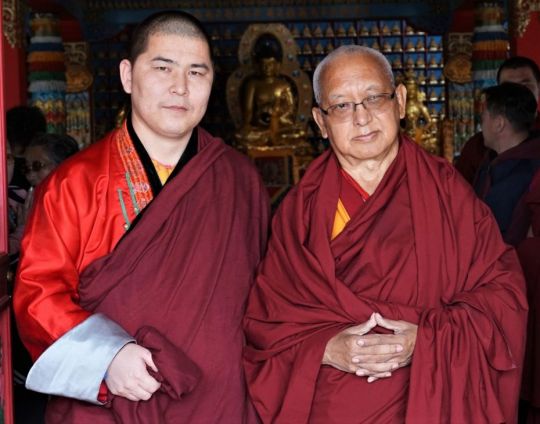
Lama Zopa Rinpoche with Danzan Ravjaa Rinpoche, the 9th reincarnation of the Lama of the Gobi, Mongolia, May 2017. Photo by Ven. Lobsang Sherab.
CORRECTED, May 11—This post has been corrected. We apologize for the errors that appeared in this blog as it was originally published on May 10.
Lama Zopa Rinpoche—who has been touring Mongolia this month, giving teachings, blessings, and initiations—visited Dolma Ling (Dulmaling) Nunnery in Ulaanbaatar on May 2.
The Dolma Ling existed long in the past, but was partially destroyed in the 1930s along with many other religious sites in Mongolia. Greater religious freedom in the 1990s led to initial steps to re-establish the site, and in 2001, the temple and grounds were offered to Lama Zopa Rinpoche. The nunnery’s original building, which is unique and beautiful, is still to be found at the site, and is awaiting restoration.
Rinpoche spent time talking with the Dolma Ling nuns about improvements needed at the nunnery, and discerning next steps for moving forward.
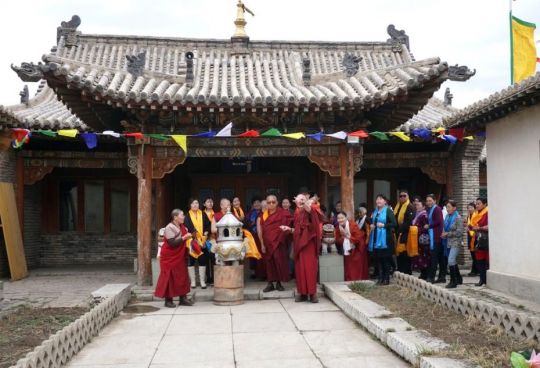
Lama Zopa Rinpoche standing in front of the original building of the historic Dolma Ling Nunnery, Mongolia, 2017. Photo by Ven. Lobsang Sherab.
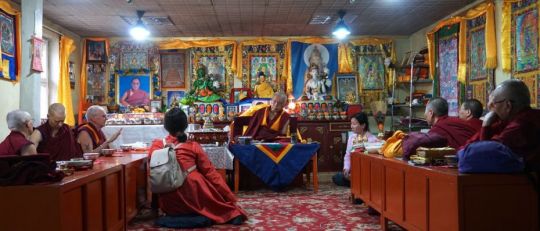
Lama Zopa Rinpoche meeting with nuns at Dolma Ling Nunnery, Mongolia, May 2017. Photo by Ven. Lobsang Sherab.
Dolma Ling is located on the same land as the Lamp of the Path soup kitchen. This much-needed social service project offers lunch to more than eighty homeless people a day in a small building.
“The soup kitchen is small but very inspiring! Particularly in the winter, it seems to be a lifesaver for the many homeless people in this area, which is quite a poor area and a long way from other services,” Ven. Holly Ansett reported. “The project grows its own vegetables during the short spring/summer growing season, which was very heartening for us to see.”
On May 3-4, Rinpoche and about twenty-five others, including several monks and the abbot from Idgaa Choizinling Monastery (ICM) in Ulaanbaatar drove for close to seven hours into the Gobi Desert (southeast towards China). Halfway there, Rinpoche and the group stopped for a picnic lunch; monks from ICM had come the day before to set up a beautiful ger (a Mongolian tent or yurt) for the group where they offered lunch. Although a sand storm made getting from the vehicles into the ger a bit tumultuous, once inside, everyone found it very cozy. The ger was set up in a place called Choyr. In the past, there was a monastery there with 1,500 monks, but this was destroyed in the 1930s. Not far away was a very blessed rock carving of Hayagriva Garuda Vajrapani. Thus Choyr is considered a holy place. The area was under the ocean millions of years ago, and the rocks there are unusual and known for containing fossils.
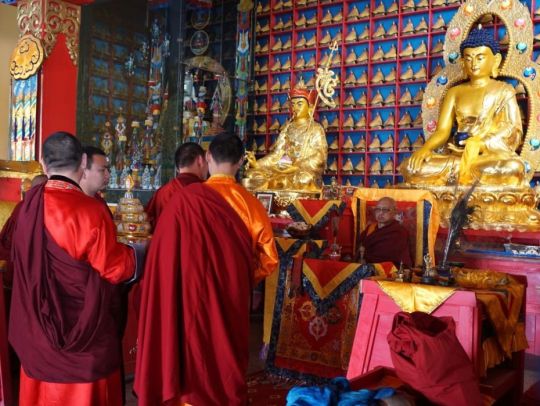
Monks of Khamar Monastery offering mandala to Rinpoche. Mongolia, May 2017. Photo by Ven. Lobsang Sherab.
The next day the group visited Khamar Monastery, which is located in a desert—very stark and dry, with not a tree in sight. When Rinpoche arrived, the monks were doing Tara practice; they quickly offered Rinpoche a mandala offering. Rinpoche also met Danzan Ravjaa Rinpoche, who is the 9th incarnation of the Lama of the Gobi. Rinpoche also visited the small nunnery next door to the monastery.
Next Rinpoche went to Shambhala land—an area of stupas, temples, and other monuments reputed to be a gateway to the legendary Shambhala—to visit caves where past meditators stayed in retreat.
From there, Rinpoche and the group headed back to Ulaanbaatar. As they drove, they passed many herds of wild horses, goats, sheep, cows, and camels. Rinpoche stopped a number of times to bless the animals. He had a portable loudspeaker and, in the hope of leaving imprints, recited many prayers and mantras, such as the long and longest Chenrezig mantras, the Medicine Buddha mantra, the Maitreya Buddha mantra, the Namgyälma mantra, and lamrim prayers.
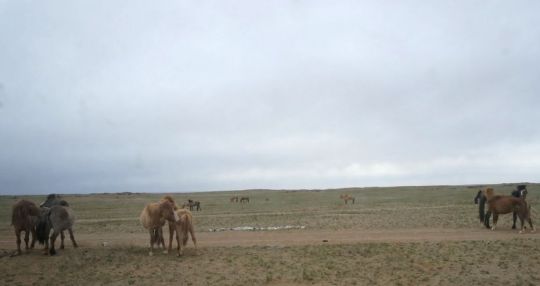
Wild mares that Rinpoche blessed in the Gobi Desert, Mongolia, May 2017. Photo by Ven. Lobsang Sherab
“Many times the animals actually listened, ears pricked. When we stopped to bless the wild mares, for example, they actually ran up to the side of the car where Rinpoche was reciting so they were close. It really seemed that they wanted to be able to hear his voice,” Ven. Holly said.
On the way back to Ulaanbaatar, the group stopped at the same ger as before for a late lunch, and the monks from ICM requested an oral transmission from Rinpoche. He gave a short teaching and oral transmission in the ger of the Four Mindfulnesses, a teaching by Manjushri to Lama Tsongkhapa. Rinpoche gave the teaching and transmission in Tibetan, and they were translated into Mongolian and English. The group left the ger as the sun was setting, and the whole sky turned red. “It was an incredible sight,” reported Ven. Holly, “The desert views were breathtaking!” The group arrived back at FPMT’s center in Ulaanbaatar at midnight.
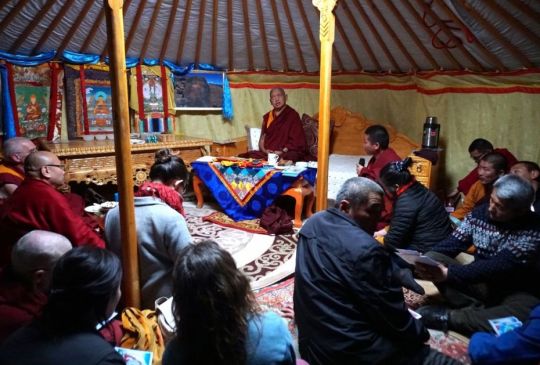
In a ger (yurt) in Choyr in the Gobi Desert, Rinpoche giving an oral transmission of the Four Mindfulnesses, a teaching by Manjushri to Lama Tsongkhapa, Mongolia, May 2017. Photo by Ven. Lobsang Sherab.
On May 6, Rinpoche went to visit the FPMT center in Darkhan, in Northern Mongolia, the Golden Light Sutra Center (GLS), which is a four-hour drive north towards the border with Russia. On the way were beautiful mountain landscapes, though with hardly any trees. Again, the group saw many animals, including wild horses, sheep, goats, and cattle. Rinpoche stopped over and over to bless animals, and the drive took extra time due to this. The group was accompanied by the abbot of ICM as well as Geshe Thubten Zopa from Sera Je Monastery. Geshe-la is assisting the tantric college at Ganden Monastery in Ulaanbaatar, and also teaches at the FPMT center in Ulaanbaatar, Ganden Do Ngag Shedrup Ling. While in Darkhan, Rinpoche had a short meeting with the board of GLS center, a short TV interview, and enjoyed both lunch and dinner with the governor of Darkhan province, and with the city governor who is on the GLS board.
The next day Rinpoche visited Ganden Tara Monastery and gave oral transmissions of the Thirty-Five Buddhas and Seven Medicine Buddhas, and a prayer to spread the teachings of Lama Tsongkhapa to the thirty or so monks. Rinpoche then gave a public talk to more than 300 people. In the talk, he gave advice on how to meditate on emptiness, including how to do one’s daily activities with the mind in emptiness and live one’s whole life doing all activities from this mind.
Leaving Darkhan, the group drove the four hours back to Ulaanbaatar, again stopping a number of times to bless the many animals along the road.
Rinpoche’s teachings before the Great Chenrezig Initiation at Idgaa Choizinling Monastery—organized by Ganden Do Ngag Shedrup Ling—will be streamed live on FPMT’s YouTube channel, on Lama Zopa Rinpoche’s Facebook page, and on FPMT’s Facebook page.
The live-streamed teachings are scheduled for:
- May 10, 7 p.m. local time (GMT+8)
- May 11-12, 6 p.m. local time (GMT+8)
Watch here on FPMT’s YouTube channel:
https://www.youtube.com/c/fpmtinc/live
PLEASE NOTE: Live webcasts of Lama Zopa Rinpoche’s teachings are now on YouTube. We will no longer be streaming Rinpoche’s teachings from Livestream.com. Please bookmark this YouTube link for live video of the teachings in Mongolia and Rinpoche’s other future live-streamed teachings:
https://www.youtube.com/c/fpmtinc/live
Lama Zopa Rinpoche is the spiritual director of the Foundation for the Preservation of Mahayana Tradition (FPMT), a Tibetan Buddhist organization dedicated to the transmission of the Mahayana Buddhist tradition and values worldwide through teaching, meditation, and community service.
- Tagged: animals, fpmt mongolia, lama zopa rinpoche, mongolia, video
- Home
- News/Media
- Study & Practice
- About FPMT Education Services
- Latest News
- Programs
- New to Buddhism?
- Buddhist Mind Science: Activating Your Potential
- Heart Advice for Death and Dying
- Discovering Buddhism
- Living in the Path
- Exploring Buddhism
- FPMT Basic Program
- FPMT Masters Program
- FPMT In-Depth Meditation Training
- Maitripa College
- Lotsawa Rinchen Zangpo Translator Program
- Universal Education for Compassion & Wisdom
- Online Learning Center
- Prayers & Practice Materials
- Overview of Prayers & Practices
- Full Catalogue of Prayers & Practice Materials
- Explore Popular Topics
- Benefiting Animals
- Chenrezig Resources
- Death & Dying Resources
- Lama Chopa (Guru Puja)
- Lama Zopa Rinpoche: Compendium of Precious Instructions
- Lama Zopa Rinpoche: Life Practice Advice
- Lama Zopa Rinpoche Practice Series
- Lamrim Resources
- Mantras
- Prayer Book Updates
- Purification Practices
- Sutras
- Thought Transformation (Lojong)
- Audio Materials
- Dharma Dates – Tibetan Calendar
- Translation Services
- Publishing Services
- Teachings and Advice
- Find Teachings and Advice
- Lama Zopa Rinpoche Advice Page
- Lama Zopa Rinpoche: Compendium of Precious Instructions
- Lama Zopa Rinpoche Video Teachings
- ༧སྐྱབས་རྗེ་བཟོད་པ་རིན་པོ་ཆེ་མཆོག་ནས་སྩལ་བའི་བཀའ་སློབ་བརྙན་འཕྲིན།
- Podcasts
- Lama Yeshe Wisdom Archive
- Buddhism FAQ
- Dharma for Young People
- Resources on Holy Objects
- Ways to Offer Support
- Centers
- Affiliates Area
- Teachers
- Projects
- Charitable Projects
- Make a Donation
- Applying for Grants
- News about Projects
- Other Projects within FPMT
- Support International Office
- Projects Photo Galleries
- Give Where Most Needed
- FPMT
- Shop
Translate*
*powered by Google TranslateTranslation of pages on fpmt.org is performed by Google Translate, a third party service which FPMT has no control over. The service provides automated computer translations that are only an approximation of the websites' original content. The translations should not be considered exact and only used as a rough guide.In the lam-rim, there’s some advice on how to get up early in the morning without being overwhelmed by sleep. Before getting into bed the night before, wash your feet while thinking of light. Try it; it works.








